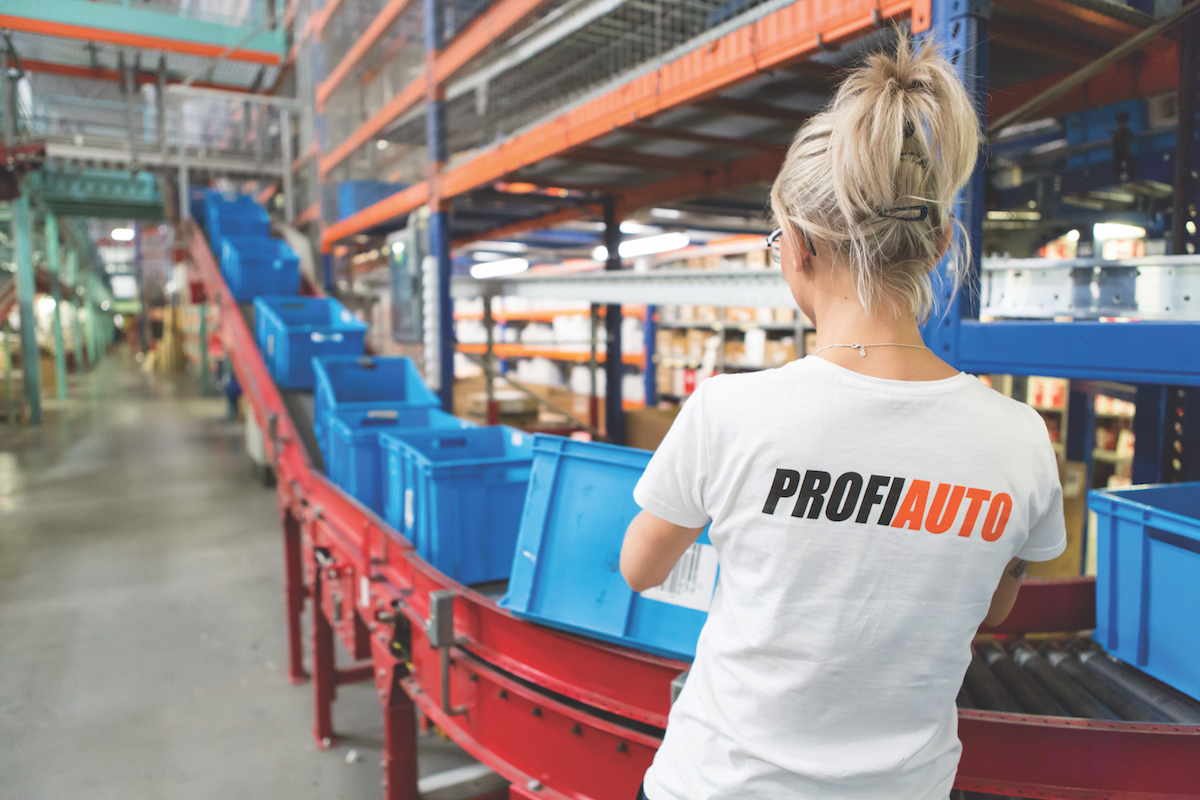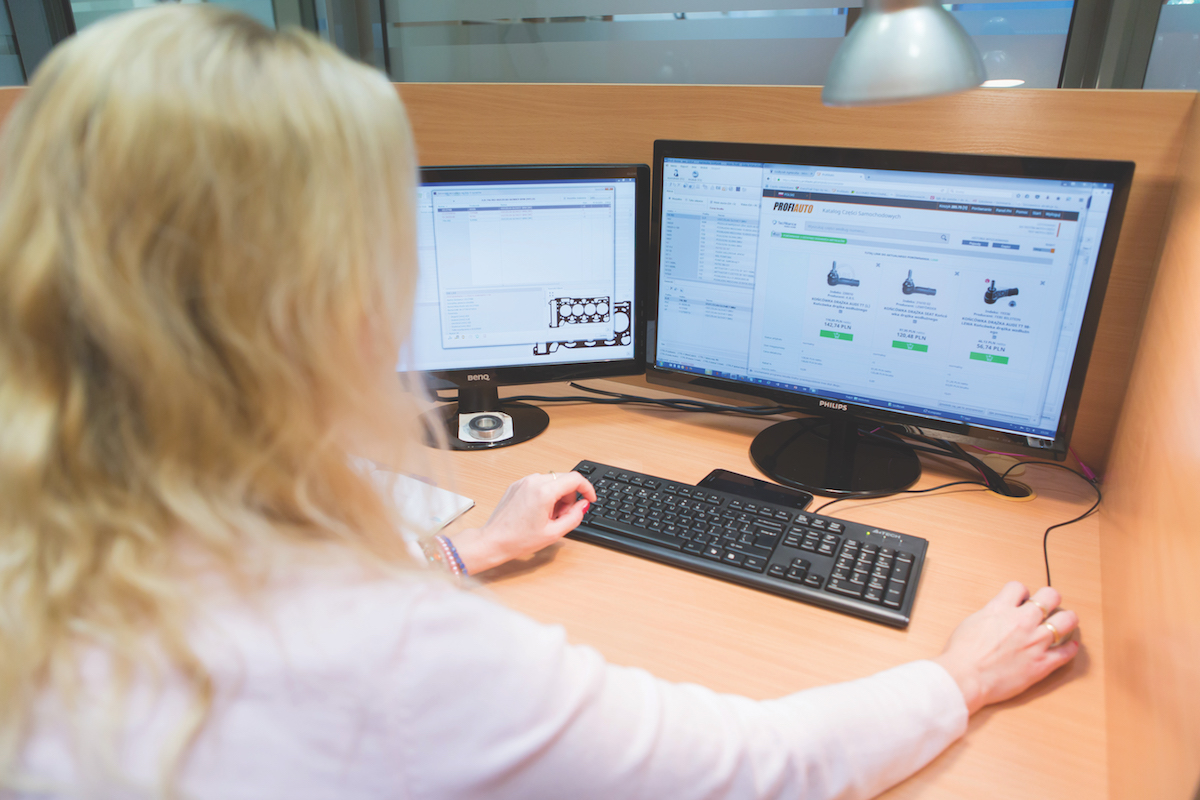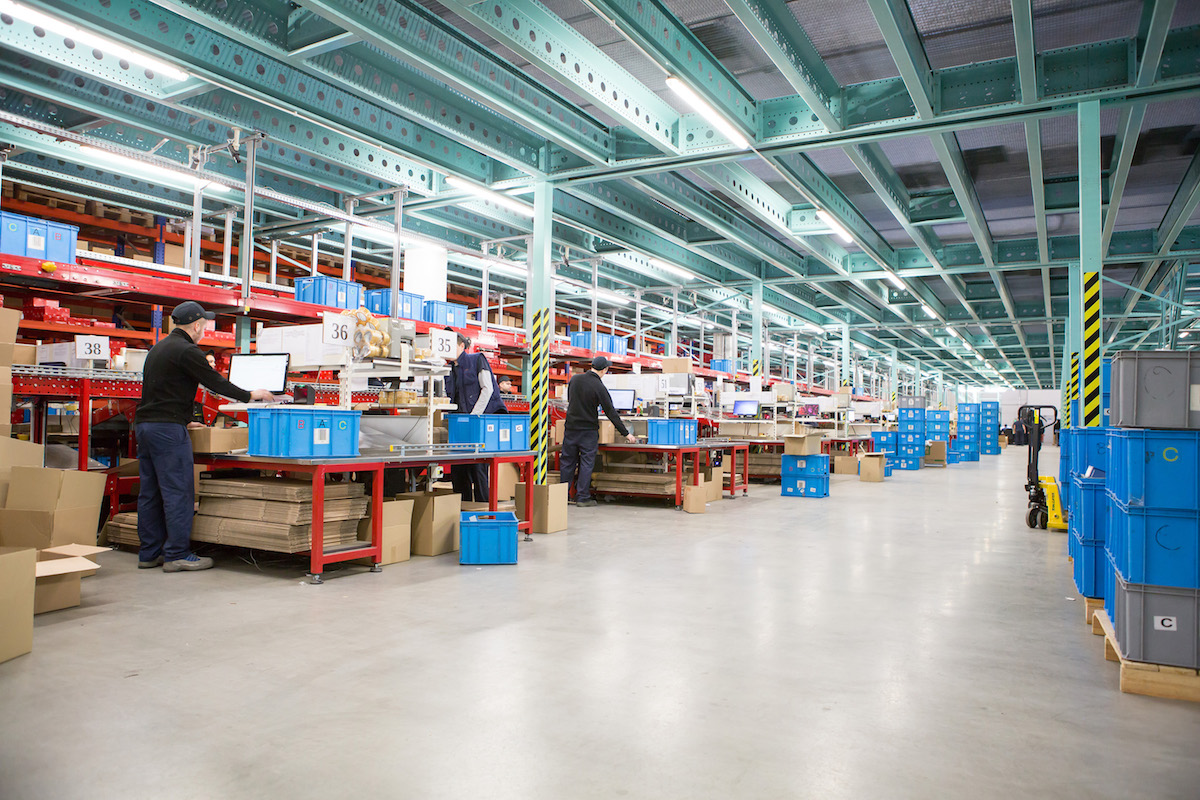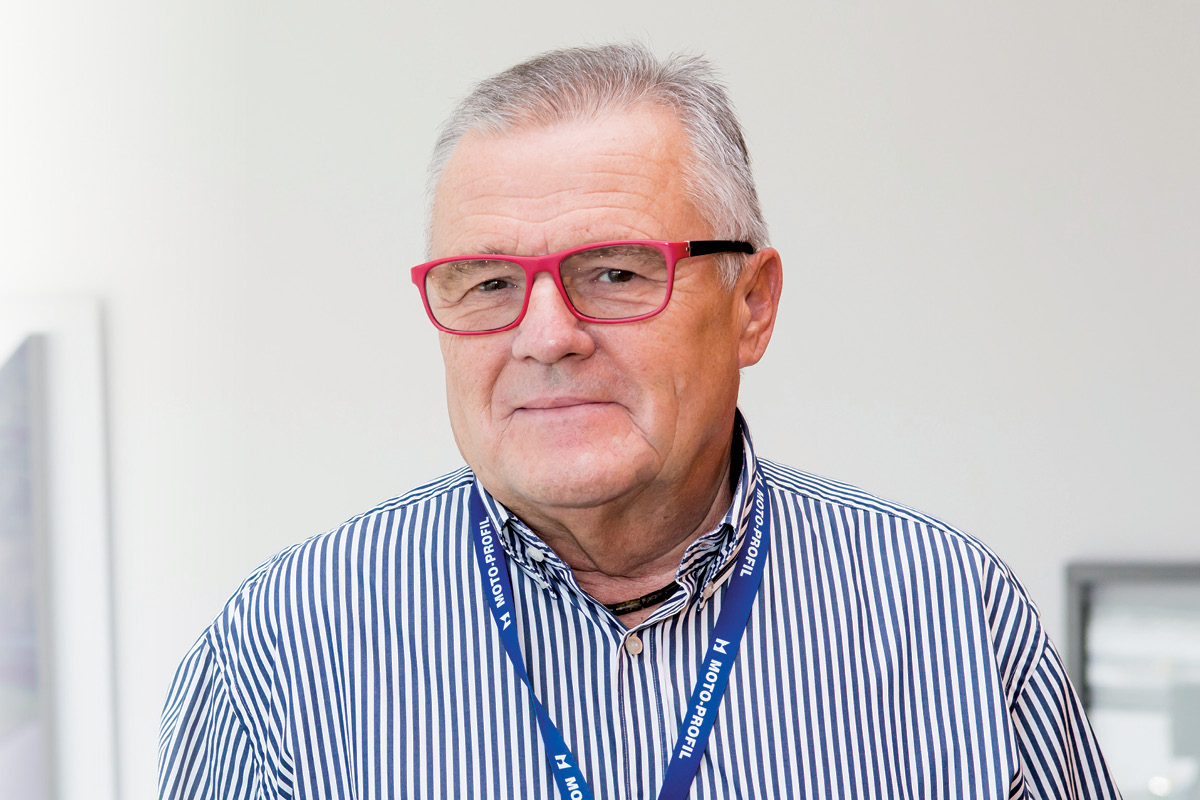Across the 45,000-square-metre precinct that makes up the headquarters of Polish auto parts distributor Moto-Profil, it is evident the workers enjoy being there. “It feels like a fast-paced environment, but people are doing their own thing,” says Moto-Profil President Piotr Tochowicz. “They are not pressured and they know what they are doing. They are doing it in a professional way, but they seem happy. They seem to enjoy what they are doing.”
The most obvious sign of this is the lack of tension in the air – the sense of, ‘Watch out! The big boss has arrived!’ To Piotr, he is not “this special guy”. “I’m not a leader. I’m just a normal guy,” he says. “The leadership that I’m trying to do is based on the thinking that I’m a normal guy.”
Piotr Tochowicz is a people person
Contrary to many business-owners who trot out the ‘family’ cliché, Piotr refers to the idea of family in a business management context as “stupid”. However, he does his best to ensure the workspace in Chorzów, 90 kilometres from Kraków, Poland, is nice and comfortable for the workers, most of whom know him on a first-name basis.
“Nobody calls me ‘Mr President’ or ‘Boss’. They call me ‘Piotr’,” he notes. Some of the newer workers, unfamiliar with the informal work culture, do address him as ‘Mr Piotr’, or using some other, more formal salutation. Piotr is okay with that. However, in his experience, when company heads begin to assume that they are ‘above’ the other people in the firm, that is when everything, in his words, “goes to hell”. “They want the golf days. They are thinking, ‘Ah, I’m a special guy!’ If you are thinking like that, then that is the end of the story,” he says.
“Therefore, I try to be a normal guy, a guy who can make mistakes and have problems. This is my style of leadership.” Staff engagement is a fine art for many people at a C-suite level. For a company with 700-odd employees, Piotr concedes he is not going to get to know each one of them properly. “I can go to the stock room, see the people, and go, ‘Good morning, good morning, good morning,’ and not know them. I don’t like doing that,” he says.
Regardless, Piotr loves speaking with people. For example, he adopted a rule where everyone had to phone him once a week. However, when he realised that it might be a waste of time for someone to phone him just to tell him that nothing untoward had happened, he proposed that an email would suffice. The point of the exercise for Piotr was to learn from the staff’s experiences.
“I love that I’ve got these people who can tell me, ‘You’re ridiculous. What are you talking about? That’s a bad idea,’” he says. “This is important because sometimes I need to see what’s going on, and there may be something wrong, but I’ll go all day and not know because nobody told me. The most important information is usually the bad information, not the good.”

Piotr needs to tread a fine line between providing workers independence and keeping them aligned with company values. “We’re trying to let them do, maybe not what they want, but what is in line with the company with some independence. Do what is good for the company but in your own style and with your own system.”
Compromise is everywhere, according to Piotr, who cites his ability to compromise as one of the reasons why he is where he is today. “Everywhere you’ve got to make compromises. In marriage, or with your girlfriend, there is compromise after compromise. Like me and my [business] partner Leszek Zurek, for example: We have been working together for 34 years, but others say, ‘Huh? It’s impossible to work with somebody for 34 years. It would be boring,’” he says. “Yeah, maybe it’s boring, but if you are open to compromise, it’s okay.”
Freedom from Communism
Ever since high school, Piotr wanted to be rich. His interest in cars simply followed from there. “The guys who owned garages of cars, they were rich guys. I wanted to be like them,” he says. Piotr’s first exposure to automotive engineering was in 1973, studying at the Kraków Politechnika. The motorisation of Polish society was just taking off, marked by the manufacture of the Polski Fiat 126p, the iconic car of the time.
“The exams for the Kraków Politechnika were very tough, but I passed them,” Piotr recalls. “During my studies, I learned how to build cars, but of course it was not the modern cars but the older ones. That was a problem with the Communist system.”
It would not be the first time in Piotr’s working career that he would butt heads with the Communists. “When I was working for four years for a government company, I had a very bad boss. He was from the Communist Party. He was completely crazy and knew nothing about cars or the repair of cars,” he explains.
“After those four years, I promised myself that I would never have a boss again. If you take your life in your own hands, you can do something with it.” The experience would provide the impetus for Piotr to start his own business. As is the case with any start-up enterprise,
it wasn’t easy starting out, and there were several cases of learning by trial and error.
“You have to be prepared for a hell of a lot of risks and a lot of work. For people who have ambition and want to achieve something special, that is an important lesson.” The lesson of hard work was already ingrained in Piotr by then.
During a student vacation in London in 1976, he was earning a living in construction in the black market, converting old Victorian houses into flats. “The rooms were around five metres tall and the heating was awful, so we made special roofs that were not as high. It was very tough work,” he remembers.
Piotr’s first solo venture was in 1983, a business making screw automats for Polish train and electronics companies. Soon after, he began trading in colour metals, shop equipment and shop furniture. “They were made with the help of German partners. The furniture was fantastic and we sold it using big trucks weekly. It was a very good business,” he recalls. In addition, Piotr also ran a small network of grocery stores that were very successful. It was not until 1990, barely a year after the fall of the Iron Curtain, that Piotr had his first encounter with automotive spare parts.
“So many cars were coming from abroad, and there was no possibility of having enough spare parts for them, because the cars were in a rather bad state – very old and used – from Germany, Holland and France,” he says. “We understood then that there was a market for spare parts, and for a good car garage and good mechanics.”
But it was the moment that Piotr crossed paths with two sales representatives from Monroe Shock Absorbers that would change his life for good. “They wanted us to be one of the six distributors of Monroe in Poland. We said, ‘Of course! Yes!’ ” Piotr realised he could kickstart a distribution network without the need to commit to major capital expenditure with money that he simply did not have.
“The biggest problem for us was finance,” he says. “From the beginning, we started making great sales, but great sales means you need more stock, and to have more stock you need more money.”
Auto parts manufacturers Schaeffler, NGK, GKN and Reinz soon followed. Then and there, Piotr decided to narrow his focus to automotive spare parts. With his friend and business partner, and today Vice-President of the Board, Leszek, who continues to work alongside him to this day, Piotr did away with all the other businesses – furniture, colour metals, grocery stores. In 1993, Moto-Profil was born.
Moto-Profil makes history
When Moto-Profil opened its doors, it was only four years after the fall of Communism, and Nobel Peace Prize laureate Lech Walesa was the country’s president. Piotr remembers something Walesa said that has since guided his approach to decision making.
“He said something like, ‘You know, I’m always asking for advice. In my experience with these scientists and these economists, when we are thinking about some problem, I’m making a decision after three minutes, and they are making the same decision after three years,’ ” Piotr recounts.

“Our lives are going like a space rocket. You can’t make a slow decision. You have to make it very fast. If you do something fast, even if it’s not very wise, sometimes it works better than a decision that is very wise but is slow.”
It turns out that such quick decision making is working out quite handily. The growth of Moto-Profil has been nothing short of meteoric. In 2000, it had a revenue of €5.4 million. In 2007, that figure grew by more than 10 times that amount to €65 million. Last year, revenue was at €210 million.
Such success has not gone to Piotr’s head. He knows he has been through too much in life to assume something like that could last forever. “Don’t think that you always have it right, that you are wise and smart, because it’s not true,” he says. “ You can always make mistakes and you can always make some silly moves. This is very important, and therefore I’ve got these mirrors in my employees and my friends.”
Don’t think that you always have it right, that you are wise and smart, because it’s not true. You can always make mistakes and you can always make some silly moves.
Moto-Profil is the only one of the six original distributors for Monroe Shock Absorbers in Poland still operating today. Asked why that might be the case, Piotr says he thinks it’s due to the company’s ability to adapt to change. “Because things are constantly changing around the business, the business itself can’t remain the same. What I have learned from my experience is that you need to observe and adapt to what is coming,” he says.
What I have learned from my experience is that you need to observe and adapt to what is coming.
On the flip side, Piotr also believes a lack of will on the part of the other distributors to adapt to change may have been a factor. “They thought that if they could focus purely on the one product that was going » well and specialise in it, they could start monopolising the market. But if a company starts to monopolise a market, another competitor is going to come along and challenge that monopoly,” he says.
“The five other distributors of Monroe would stay put and wait for the customers to come because they just wanted to stay in one market hoping to become a monopoly. But we were different. We worked in other businesses and we knew that we needed to aggressively pursue other markets.” Starting with shock absorbers, Moto-Profil then moved on to full suspensions and, after that, brake pads.
Lessons in partnership
Seven years into the life of Moto-Profil, Piotr thought he had learned enough about human behaviour to successfully run a business. But in 2000, more lessons were to come. He met a couple of businessmen, Frans Van Heck and Adriaan Roggeveen, who wanted to form a strategic partnership. Both were partners in Van Heck, a leading Dutch auto parts firm at the time. Moto-Profil needed extra support, while Van Heck had plans to move into the Polish market.
“Because we had some problems with some of the technical parts of our company, we sold them 25% of Moto-Profil, not for money but for the tools, equipment and infrastructure.”
The partnership did not last, but Piotr calls it the most important experience in his career, where he first learned about the importance of efficiency.
“In this crazy world where the margins are going down, the prices are going down, efficiency is the god of our business. If you boil it down, it essentially means not spending money on stupid things,” Piotr says. “It is important that we create systems where our guys at all levels of the business are thinking about our costs, our efforts, about people and systems management. This is very important.”
Being Moto-Profil’s first foray into Western Europe, he also learned that, despite having preconceived notions of the region, business culture wasn’t that much different to the Eastern side where he has spent his entire life. “I always thought that immorality, thievery and cheating were on our side of the Berlin Wall, and on the other side there was efficiency, solidarity and trust,” says Piotr. Adriaan responded to this remark with a big dose of reality. “He said, ‘Piotr, don’t be stupid. People are the same everywhere.’”
At some point during the partnership, Piotr realised that the business path Van Heck wanted to take was vastly different to Moto-Profil’s. Van Heck wanted to become a big company, while Moto-Profil wanted to remain a Polish independent. “Van Heck was only doing business with the wholesalers, the jobbers, and not selling to the small garages. They had 50 to 80 wholesalers, rather big firms,” explains Piotr.
“The most important thing for us was to have branches closer to our target market. If there is an opportunity to buy a branch, we will buy it. Either way, it’s in our best interests because we’ll be closer to the customer.”
Further, Piotr realised that Moto-Profil’s customer base was not providing the amount of business that Van Heck was after. “After two years of the partnership, it wasn’t so easy to make business with these guys from Holland because they wanted the results; they wanted the money,” he says. Waking up to the differences in values and direction, Moto-Profil bought back Van Heck’s share in the company at a loss. Despite this, Piotr harbours no hard feelings towards Frans or Adriaan.
Reminiscing about the partnership, Piotr is proud that, to his knowledge, he hasn’t cheated anybody and has no rancour towards anyone. “Later, I met Frans at an auto show in Frankfurt. He said, ‘Piotr, we shouldn’t have turned our backs on you. We regret doing that.’ I said, ‘You weren’t patient enough. Our results were coming but you didn’t want to wait. Sorry. But that’s okay. We are still friends,’” he recounts.
It was also with great support from Frans Van Heck that Moto-Profil became a member of Temot International [TI], one of the few automotive distributor groups in Europe. Today, Piotr is member of the TI board, and other employees are active in each of TI’s working councils.
Moto-Profil’s patient approach to business growth has served it well. In 2000, Van Heck was one of the largest auto parts firms, much larger than Moto-Profil. Now that situation has reversed, with Moto-Profil growing at a rate of 25% this year, by Piotr’s estimation. While most would be popping champagne corks at that sort of growth, according to Piotr, that is too much and strays from Moto-Profil’s strategic plan.
“I’ll admit, yes, 25% is too much. We need something like five per cent growth,” he says. “This is, of course, a very positive situation, but we’ve got plans for other areas of the business, not just for how much we can sell, because we know selling is not everything.”
Instead, Moto-Profil’s business plan is much more comprehensive. In particular, Piotr notes it is paramount that the company retains its staff. “People love feeling valued. These people, they understand the plan and that we are winning. They’ve all been tempted by headhunters to move elsewhere, but everyone knows the value they bring to this company. To me, that is fantastic.”
As Moto-Profil’s twenty-fifth anniversary looms, Piotr is most proud of the fact that most of its estimated 700 employees have stuck with him and the company through thick and thin. He singles out Managing Director Bogumił Papierniok, who has been with the company ever since it started, something Piotr says is all too rare these days.
“Even with all these changes, and all the problems we’ve had for the past 25 years, there are people still working for us who have been here from the start,” he notes. “We’ve had to kick out some people, but there aren’t many people who have left the company voluntarily.”
Asked to describe his company in a nutshell, Piotr thinks of it as a Noah’s Ark. “I’m not a very religious guy, but what we are creating here is an ark like Noah’s,” he says, “a vessel on which we are sailing in this ocean of stupidity and foolishness.”
Declaring independence
Asked about his biggest inspirations, Piotr names two family members. His father and grandfather are long gone, and had very contrasting stories, but both possessed the same elements of pride, independence and ability to succeed against the odds. Even though Piotr was too young to witness his grandfather as the successful businessman other people tell him he was, his spirit still lives on in him.

“He came from a small village, a town named Słomniki, close to Kraków. On one side of the road there was one half of the Tochowicz family, and on the other side there was the other half. He was one of the richest guys in Kraków before the Second World War. He was for me very inspiring, an example of how, from the bottom, you can rise to the top.”
Piotr’s other inspiration, his father, was a scientist, travelling as an expert with the United Nations Industrial Development Organization (UNIDO). “My father was a metallurgist,” he says. “He spent a lot of time building steelmaking factories in Peru, Mexico, Turkey, Angola and Mozambique.”
However, Piotr remembers his father best as a fearless cowboy sticking it to the Communists. “He wanted to do without the life of the Communist system. He lived well and earned good money as a UNIDO expert.” This sometimes led to problems with the police when Piotr’s father was travelling overseas.
“I would hear from my friend that he was with the police, and I said to my father, ‘I heard that you had a problem with the passport and they won’t give it to you,’ ” he remembers. “He would respond that he said to the police, ‘Rack off! I’m an expert with UNIDO. Let me go!’ ”
Reflecting on his life, Piotr does have a few regrets. He wishes he had learned more languages as a teenager. “My father knew seven languages. He always kept telling me, ‘Learn languages. Learn languages. This is important,’” he says.
But in both business and in life, Piotr continues to live by a simple creed that serves him well: Live, and let live. “Of course, there will be some companies, some bosses and some guys from top management that want to eat everything, thinking about how they can dominate a market or become a monopoly,” he says.
Aware of the dog-eat-dog realities of business, Piotr says this approach is the major difference between Moto-Profil and other companies. “We’re trying not to eat too much and not to eat everything. The best solution is to give bits to others,” he explains.
“We don’t want to eat up all of the market. We want to do business with others. Of course, we want to do business based on a system in which we can remain independent. But let’s remain independent together. That is my way of thinking. That is the biggest difference.”



